5 Backup Plans That Would Have Changed Modern History
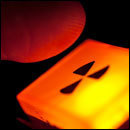
Backup plans are, by definition, not the best-case scenario. But usually they can be counted on to be reasonably close to Plan A. Sometimes, it ends up being even better than Plan A (Michael Jordan was the third pick in the 1984 NBA draft). Other times, they're far worse (Sam Bowie was the second pick in the 1984 NBA draft). But you rarely hear about the backup plans that are chambered and loaded and just never get used. Here are five that remained in the back pockets of various world leaders that, had they been used, would have changed the world, and possibly the language this article was written in.
Operation Vulture

In the early 1950s, French Indochina was under attack by communist rebels. Unfortunately for France, this meant fighting a ground war in Asia, which is like fighting a white power gang in the prison showers: You're on their home turf, and winning to them means making sure you leave wearing a straight jacket under your body bag.
After taking a beating for several years, 17 battalions of French Union soldiers went and got themselves surrounded at Dien Bien Phu. This wouldn't have been such a big deal, but the rebels had somehow Fitzcarraldoed a bunch of anti-aircraft artillery through the thick jungle to the border they'd formed around the French. The more the rebels tightened that border, the lower planes had to fly to aim the supplies and ammunition and the more they got picked off by the heavy artillery. It was like a giant noose made of machine guns. At this point, the French had two options: sit back and lament that nobody had used a sufficiently prison-rape-themed metaphor to explain the war ahead of time, or ask America for help.
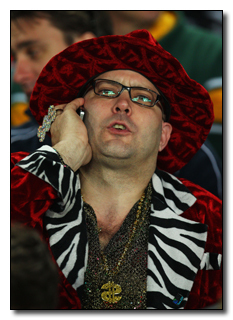
"Sup dawg? Hey, I'm gonna need you to do me a solid."
Realizing it was the heart of the Cold War and they were fighting communists, the French government picked up the red phone reserved for asking for U.S. military support. The resulting plan, Operation Vulture, would have used three tactical nuclear weapons from the Americans to turn the communist region into New Hiroshima.
The French liked the idea enough to send their top general to Washington to ask President Eisenhower personally for the passage of the plan. America had been building up a pretty bitching collection of atomic weaponry since the end of WWII and was itching to try it out. The plan climbed higher and higher up the chain of command, like the Bill from that "Schoolhouse Rock!" video with a knife in his teeth and a crazy gleam in his eye. Among the notable figures who signed off on it were U.S. secretary of state John Foster Dulles and a youngish Richard Nixon, who had actually helped draw it up. All they needed was Eisenhower, who liked the idea but had the good sense to realize that he and everyone in the government might have lost their goddamned minds over this communism thing. To hedge his approval, he agreed to the plan, but only if the United Kingdom liked it, too.
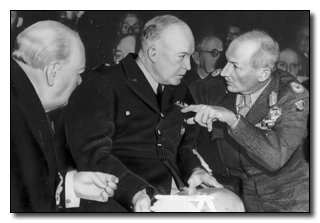
Churchill and Eisenhower warm up the mood with a game of "pull my finger."
After Britain gave a curt but polite "Are you fucking crazy?" Eisenhower acted like he never liked the idea in the first place, and the French eventually lost the battle so badly that their government resigned. The rebels took over and declared themselves the sovereign nation of Vietnam, and everyone lived happily ever after.
If They'd Gone With Plan B:
OK, America learned nothing from France's defeat, and got their ass handed to them by the same communist soldiers in the Vietnam War. Nixon's involvement in the plan came back to haunt America during negotiations to end the Vietnam War when the North Vietnamese's negotiator noted that they were having a tough time trusting America since "during the resistance against the French, Vice President Nixon proposed the use of atomic weapons." Still, Eisenhower's "we're down if England's cool with it" is probably the closest the U.S. ever came to going nuclear over the course of the entire Cold War.
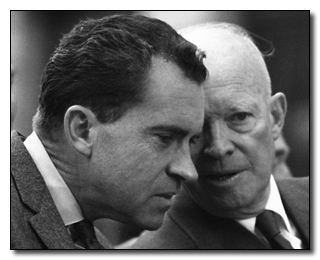
"I get what you're saying, Dick, but have you considered the possibility that you are pant-soiling crazy?"
Many experts attribute the non-use of nukes to the "nuclear taboo." The longer the Americans and Soviets went without using their atomic weapons, and the more of them they built and aimed at each other, the more disastrous the consequences of using one came to seem.
Since Dien Bien Phu was relatively early in the war, the taboo wasn't quite as strong. But had Eisenhower gone nuclear the taboo never would have existed. Even if Russia didn't immediately retaliate with an atomic bomb of their own, they would owe America one. For instance, if you're the Soviets, the Cuban Missile Crisis looks a lot different if America has shown they're willing to use nuclear weapons if someone asks nicely. It's the difference between being in a Mexican standoff with a guy who you can safely assume is a rational human being who only wants to go on living, and being in a Mexican standoff with a hit man.
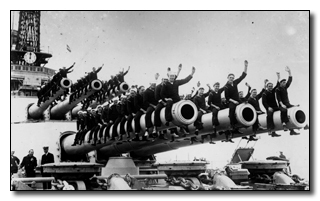
"Look, we don't really care about the argument. We just want to see what these bad boys can do."
Not for the first time, America probably owes its very existence to Britain being a total killjoy.
Huele a Quemado

In 1977, the United States was finally deciding what to do with the Panama Canal Zone, a part of Panama that had been under U.S. control since 1903. Panamanian General Omar Torrijos flew up to Washington to meet with President Jimmy Carter to insist that America return control of the canal zone to Panama and withdraw U.S. forces from the country.
The two sides eventually came to an agreement, and Carter put his name behind a treaty that would give the canal and canal zone back in 1999 under the "1999? Ha, that's so far in the future we might as well be agreeing to give it back to them in heaven" theory of international relations. The controversial treaty went to Congress for approval. Little did the U.S. know that, in the event of Congress voting to not let go of the canal, Torrijos and Panama had a backup plan, which reasoned that if Panama couldn't have it, then no one could.
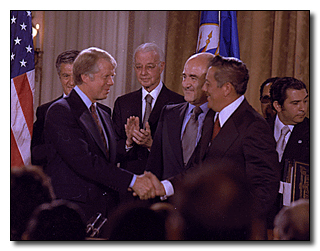
"Don't let 'em see you crack, baby. This breakup is the best thing for everyone."
A few months prior to the Torrijos-Carter hoedown, future Panamanian president/coke dealer Manuel Noriega, then only a Panamanian army officer/coke dealer, trained troops and put sleeper agents in villages neighboring the canal zone. If the treaty failed, the agents would have launched attacks on the canal.
According to the plan, cleverly code-named "huele a quemado" (Spanish for "It smells like something is burning"), if Panama didn't get the canal zone back, Torrijos would render the canal "inoperable."
Luckily, for all parties involved, Carter had one of his few victories as president, getting the transfer signed and passed in Congress. By a single vote.
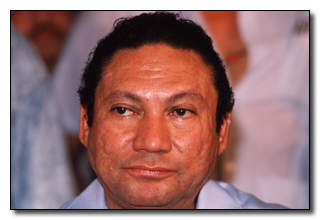
"Well I guess we'll have to blow something else up now."
If They'd Gone With Plan B:
If a single vote had gone the other way, a popular radio personality would have delivered what sounded like his ordinary address that night on Panamanian radio. In reality, the address would have contained a coded message to the commandos embedded around the country, who would have launched attacks on the gates and dams that regulate water levels in the canal, as well as the locomotives that pull ships. By the time the sun rose the next morning, millions of dollars in goods would have been stranded on the Atlantic and Pacific sides of the canal, and the U.S. would have been at war with Panama.
As Torrijos mentioned to journalist Graham Greene, while the U.S. would be able to fix the damage in days, you'd need to wait for "three years of rain to fill the canal. During that time it would be guerrilla war waged from the jungle."
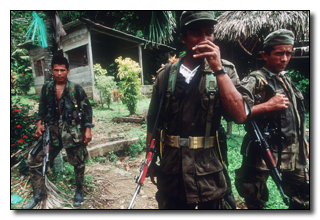
Which eventually became the theme to every action movie from the 1980s.
Keep in mind that this was two years after the last Americans were airlifted out of Saigon, and the American economy was failing in such strange and inexplicable ways that Carter eventually took to diagnosing the U.S. with the first case of national depression. This would have meant another costly war between the United States and a communist government in one of the densest jungles in the world two years after the U.S. had just gotten out of one that had crippled its will to fight. And as opposed to Vietnam, the U.S. probably would have needed to fight them for the Panama Canal out of economic necessity.
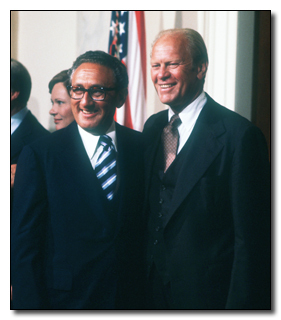
We couldn't risk losing entire shipments of gigantic ties, is what we're saying.
Operation Downfall

After Germany failed to hold up their end of the plan to dominate the globe with evil, the Allies looked to the Pacific and realized that Japan wasn't even sort of getting the hint. U.S. President Harry Truman was faced with two overriding options: Drop a new experimental weapon on Japanese cities or plan an invasion. The experimental weapon would be the first (and in retrospect only) nuclear bomb used in warfare. There was no guarantee that the weapons would cause Japan to surrender, or that they'd even work. And then you had to hope that the rest of the world would be OK with the fact that you just made an entire city disappear with quantum mechanics.
Behind door number two was an invasion named "Operation Downfall," and historians and military officials alike agree that it would have been a motherfucker.
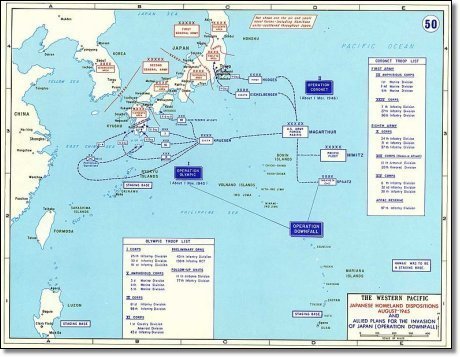
John Madden's head would explode just looking at this.
Due to the extreme secrecy of the Manhattan Project, Operation Downfall was mostly planned by members of the U.S. military who didn't know there was such a thing as atomic weapons. They decided they would invade from the bottom island of Kyushu and work their way up. When Truman made his decision, troops were being moved into position toward the debarkation point on Okinawa. The Military was so certain things were about to go very badly for U.S. soldiers that 500,000 Purple Hearts were made in preparation, a number so large that the medals have been used to supply every single war since, including Korea, Vietnam, Iraq I and Iraq II, with about 100,000 still left over.
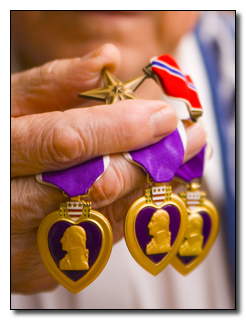
"I stubbed my toe in the shower, and they told me to just grab a handful of them."
If They'd Gone With Plan B:
As part of the decision-making process, Truman asked military leaders to estimate the number of casualties that would have resulted from Operation Downfall. Keep in mind that these men did not know that they were being asked to assess one of two plans. They were giving a realistic assessment of the invasion they were about to lead. While estimates varied, the head of the Department of War (now the Department of Defense) estimated that it would take "1.7 to 4 million American casualties, including 400,000 to 800,000 fatalities, and 5 to 10 million Japanese fatalities."
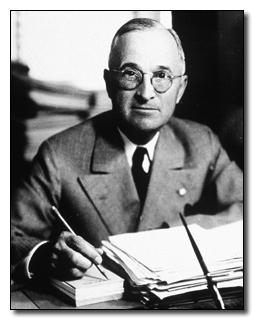
"Plus, like, all of Canada."
Up to that point, only 250,000 Americans total had died in the war, with the U.K. suffering a similar number of casualties. And tripling that number was optimistic.
It's worth noting that the Japanese had put all their chips on guessing the Allied invasion strategy, and had guessed correctly. They had already amassed all their troops exactly where the Allies would be invading. So that best-case scenario wasn't happening.
It's now believed that the war would have lasted until at least 1947, but the implications would have reached way further into the future. The second half of the 20th century was defined by the baby boom that immediately followed the war, which helped drive American prosperity in the 1980s and '90s. Operation Downfall not only would have delayed that bumper crop of able-bodied workers, but also it might have canceled it altogether. The returning bunch of soldiers who were supposed to be sexing a demographic anomaly into existence would have been devastated. Meanwhile, Japan would have become a "nation without cities," thanks to extensive air strikes that were part of Operation Downfall.
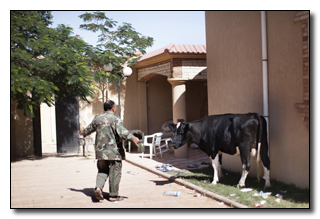
"Hey, asshole -- we told everyone to grab a plane."
So the two biggest economies of the second half of the century would have spent years wiping each other out and recovering from the process instead of creating the computer you're reading this on, and the more inventive pornography you watch on it.
If One Nuke Had Been Accidentally Launched ...

While the Cuban Missile Crisis gets all the glory for being the week that almost killed everyone, there were several weeks during the Cold War when the world was on the brink of a nuclear war, and no one had a clue. We've briefly mentioned September 26, 1983 before, when a retired Soviet Air Force colonel named Stanislav Petrov decided to let you be alive right now.
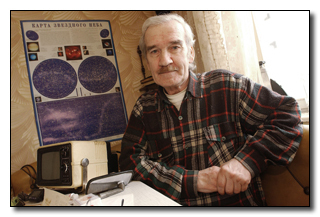
We all owe him at least one missile silo filled to the rim with beer.
He was manning an early attack detection booth when the one thing his training had prepared him for happened: His radar suddenly went berserk with what was unmistakably five American nuclear warheads headed straight for Mother Russia. It was actually a once in a lifetime sun glare creating the illusion of five missiles, but Petrov didn't know that. After retiring, and suffering the most well-earned nervous breakdown of all time, he explained that he had kept his cool because the moment wasn't scary enough. His background as an Air Force colonel told him what an American attack would look like. The only thing stopping him from firing back was his gut feeling that the fleet of bombs was a little too small to make sense.
On the left-hand side of the Atlantic, America almost launched a nuclear attack when a bear tripped a border alarm on an Air Force base that somehow got its wires crossed with the airbase's nuclear air raid siren. That time, the fate of the world came down to people in the control tower realizing their error and speeding down the runway to catch a plane that was on its way to drop a litter's worth of Baby Boy's on Russia.
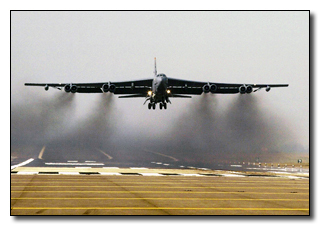
The world record for the number of people saying "shit" simultaneously was shattered that day.
To recap, outside of the Cuban Missile Crisis, the closest the world has come to nuclear apocalypse looked a hell of a lot like slapstick comedy. It wasn't that Americans and Russians weren't taking this nuclear thing all that seriously, it's just that they were too busy constructing their backup plans for a nuclear attack.
If They'd Gone With Plan B:
Had Petrov launched a nuclear counterattack like his training had told him to, Congress would have been whisked off to a bunker in West Virginia, of all places. Operation Greek Isles worked with the Greenbriar Hotel near the Virginia border to secretly build a giant underground complex to house the members of Congress and their families. The new complex came complete with dorms, kitchens, a complete replica of the House and Senate chambers, a radio system strong enough to allow members of Congress to help calm what was left of the nation and an incinerator for those who got radiation poisoning, because Congress had apparently seen Night of the Living Dead one too many times and thought radiation poisoning required the zombie cure.
The operation was cleverly hidden from guests within the hotel.
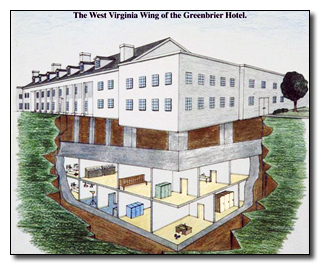
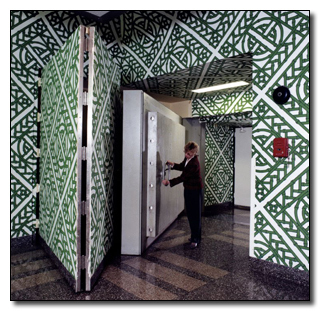

Unfortunately, there wasn't room for guests or non-essential staff of the Greenbriar, which is why the guards had orders to shoot any non-Congress people who tried to get in. Nothing like hearing a pool boy get capped and that whole "incinerate the infected" rule to raise the morale of the last Americans on the face of the Earth.
But if you thought the Americans weren't fucking around, you don't speak Russian, which has 25 different words for sacrificing human life (not fucking around being to Russians what snow is to Eskimos). Take for instance the phrase "mertvaya ruka," which means "dead hand" in Russian.
In America, that might be the name of a horror movie or a masturbation technique. In Russia, it is the name given to the giant border-wide robot installed around the city of Moscow whose only job is to kill you and everyone you've ever loved. The robot detected that a nuke had just been dropped. Ol' Dead Hand would run signals up to the silos to double check that nobody was responding. Upon confirming that the people with their finger on the doomsday button were dead (or on a piss break, whatever), the system automatically launched all the Soviet weapons at the United States. No talk. No getting permission. Not even engaging Jimmy Carter in a stern dressing down to see if you could get him to give you New York City. Mertvaya Ruka launched immediately, and cut out the middleman. And the first guy. And the last guy. It was a doomsday robot, is what we're saying here.
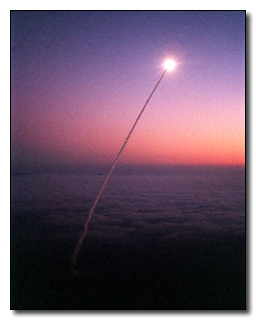
The only English it knew was "You are not the boss of me" and "Suck it."
While the Russians are unsettlingly quiet on the matter today, the mysterious UVB-76 radio transmission is believed to be part of Mertvaya Ruka, so it is generally believed to still be active in Moscow.
Soviets and Americans Reach the Moon at the Exact Same Time

A few times during his presidency, John F. Kennedy suggested that NASA and the Soviet space program conduct a joint mission to the moon. Kennedy being the first to call NASA's moonshot is pretty well documented. The guy was young and cocky, and it fits perfectly with the version of JFK we like to remember, whose biggest problem was keeping his dick from getting slammed in the window behind the many women he sneaked out of the Oval Office. But actually, Kennedy spent at least part of every day he was in office fretting over his decision, or at least looking at how much the mission to the moon was costing, and muttering "Oh shit oh shit oh shit." From a purely pragmatic perspective, the idea of a shared mission would be a chance for him to offload some of that cost onto the USSR.
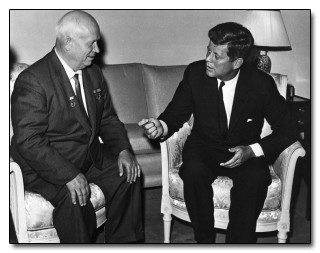
And maybe finally get to second base with Khrushchev.
Both times Kennedy suggested the collaboration, the Russians rejected it. At the time, it was assumed that this was out of cockiness or fear that Kennedy would withdraw his outstretched hand and say, "Psych!" while all the Asian and Latin American countries they were both wooing pointed and laughed. But history shows that it was more likely because the Soviets were afraid of showing the Americans just how ass-backward their space program was. Open communication with NASA probably looked to the Soviets like an invitation to shower with the Globetrotters might look to the Washington Generals: They were going to look woefully inadequate in front of people who made a living humiliating them.
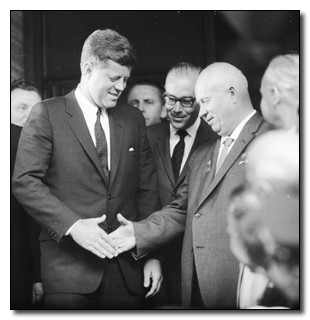
"TOO SLOW! HAHAHA! Oh, hey, you got somethin' there on your shirt ..."
But there were also reasons that Kennedy's offer would have looked pretty appealing to head communist Vladimir Khrushchev. The wall of silence between the superpowers was taking its toll on both economies. And since the Soviets were in on the dirty little secret that most of their technology was more in the "glorified bottle rocket with a terrified person strapped on" category, they would have the most to gain. Which is why Khrushchev decided to reverse course and accept Kennedy's offer as part of an effort to scale back the craploads of money they were spending on the Cold War. He realized that it was going to be wildly unpopular with much of the Kremlin, but he also saw what Kennedy saw: a chance to completely change the tenor of the space race and the Cold War at large.
There's also the not insignificant detail that Kennedy was a charming motherfucker, and he and Krushchev had built up a trust. There's apparently a bond that develops between people who have had a 13-day staring contest with the fate of the world on the line. The very week he revealed the world-changing decision to his son, Kennedy was assassinated in Dallas. Johnson made similar offers, but it just wasn't the same. Krushchev didn't trust Johnson to be his wing man on such an important decision. Kruschev's plan to go to the moon with Kennedy while sitting in a tree, K-I-S-S-I-N-G, died with Kennedy, and the Cold War went on, business as usual. Possibly 28 years longer than it had to.
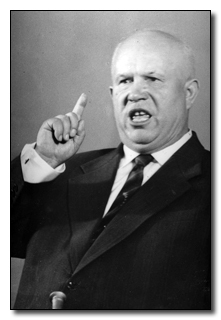
"No more! I pull finger, but it only produces the fart!"
If They'd Gone With Plan B:
It's impossible to overstate just how different things could have been if the U.S. and Soviet space programs, one of the key symbols of the technological rivalry between the two superpowers, had joined the same team.
While the U.S. eventually made it to the moon, the value of "U-S-A! U-S-A!" chants and souvenir moon rocks gained from the victory would have been outweighed by the strategic partnership (especially when you consider how easy the world has found it to dismiss the moon landing as a hoax). Krushchev's decision, too, was part of an overall plan that would have scaled back the Russian army to 500,000 soldiers from 2.5 million, and diverted spending from weapons to "consumer and commercial, non-military production."

Mostly commemorative plates.
It was like the two leaders were ready to call it a day and begin the process of ending the Cold War 28 years before it actually happened, before the Vietnam War started and before the hippie movement was born in protest. You might not speak a different language if Kennedy hadn't been assassinated, but you probably wouldn't know what the word "groovy" meant, and we think that's a different time line we could all get behind.
For instances that did alter the course of history, check out 6 Uneducated Amateurs Whose Genius Changed the World and 6 Mistranslations That Changed The World.
And stop by LinkSTORM to see Cody playing with this new war simulator he hacked into off the Pentagon's website.
And don't forget to follow us on Facebook and Twitter to get sexy, sexy jokes sent straight to your news feed.
Do you have an idea in mind that would make a great article? Then sign up for our writers workshop! Do you possess expert skills in image creation and manipulation? Mediocre? Even rudimentary? Are you frightened by MS Paint and simply have a funny idea? You can create an infograpic and you could be on the front page of Cracked.com tomorrow!